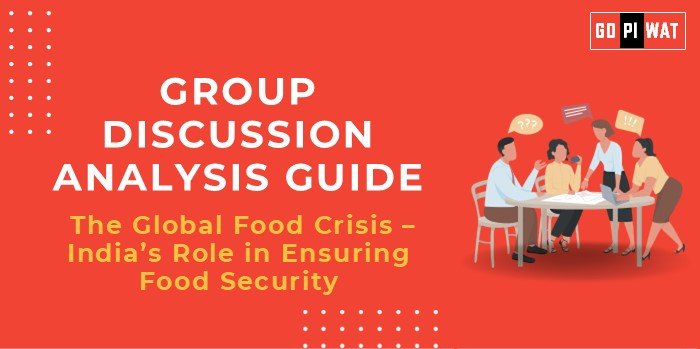📋 Group Discussion (GD) Analysis Guide: The Global Food Crisis – India’s Role in Ensuring Food Security
🌐 Introduction to the Global Food Crisis – India’s Role in Ensuring Food Security
Opening Context: The global food crisis has emerged as one of the critical challenges of the 21st century, exacerbated by factors like climate change, geopolitical conflicts, and economic instability. India, as one of the world’s largest food producers, plays a crucial role in addressing food security challenges, both domestically and globally.
Topic Background: Food security involves ensuring that all people have consistent access to sufficient, safe, and nutritious food. The global crisis has worsened due to COVID-19, the Ukraine-Russia conflict affecting grain supply, and climate-related disasters. As a significant exporter of staple foods, India’s agricultural and policy strategies have direct implications on regional and global food stability.
📊 Quick Facts and Key Statistics
- 🌾 India’s Agricultural Output: India is the world’s second-largest producer of rice and wheat, contributing substantially to global food supplies.
- 🌍 Global Hunger Statistics: In 2023, nearly 282 million people in 59 countries faced high levels of acute food insecurity, marking an increase from previous years.
- 📦 Public Distribution System (PDS) Reach: India’s PDS serves over 800 million people, providing subsidized food grains to ensure food security.
- ☔ Climate Vulnerability: Approximately 60% of India’s agriculture is rain-fed, making it susceptible to climate variability.
🤝 Stakeholders and Their Roles
- 🇮🇳 Indian Government: Implements policies like the National Food Security Act and PDS to ensure food availability and affordability.
- 🏭 Private Sector: Engages in food processing, storage, and distribution, enhancing the efficiency of the food supply chain.
- 👩🌾 Farmers: Constitute the backbone of India’s food production system, with small and marginal farmers forming the majority.
- 🌐 International Organizations (e.g., FAO, WFP): Collaborate with India on initiatives to combat hunger and improve food security.
🏆 Achievements and ⚠️ Challenges
Achievements
- 📈 Increased Food Production: India has achieved self-sufficiency in food grains, with record rice inventories reaching 29.7 million metric tons in November 2024.
- 🥣 Food Security Programs: Schemes like the PDS and Mid-Day Meal Program have significantly reduced hunger and improved nutrition among vulnerable populations.
- 🌍 Global Contributions: India has provided food aid to countries facing crises, demonstrating its commitment to global food security.
Challenges
- 🌪️ Climate Change: Erratic weather patterns and extreme events adversely affect agricultural productivity.
- 🚚 Supply Chain Inefficiencies: Post-harvest losses and inadequate storage facilities lead to significant food wastage.
- 🩺 Nutritional Deficiencies: Despite ample food production, malnutrition remains a concern, with high rates of anemia and stunting among children.
🌍 Global Comparisons
- 🇧🇷 Brazil: Has implemented successful large-scale agricultural reforms, enhancing productivity and export capacity.
- 🇳🇱 Netherlands: Utilizes advanced agricultural technologies, serving as a model for efficient food production.
📚 Case Studies
- 📈 Chhattisgarh’s PDS Reform: The state improved transparency and efficiency in its PDS, reducing leakages and ensuring better food distribution.
🗨️ Structured Arguments for Discussion
Supporting Stance: “India’s robust agricultural output and comprehensive food distribution programs have significantly bolstered both national and global food security.”
Opposing Stance: “Despite high production levels, India faces persistent challenges like malnutrition and food wastage, undermining its role in ensuring food security.”
Balanced Perspective: “While India has made commendable strides in food production and distribution, addressing systemic issues such as supply chain inefficiencies and climate resilience is crucial for sustained food security.”
💬 Effective Discussion Approaches
- Opening Approaches:
- 📊 Data-Driven Start: “With rice inventories reaching a record 29.7 million metric tons in November 2024, India stands as a key player in global food security.”
- ⚖️ Comparative Perspective: “Despite being a leading food producer, India faces malnutrition rates comparable to less developed nations, highlighting internal distribution challenges.”
- Counter-Argument Handling: “While malnutrition persists, recent policy initiatives focusing on nutritional programs and supply chain improvements indicate a positive trajectory toward comprehensive food security.”
🔍 Strategic Analysis of Strengths and Weaknesses
Strengths
- 🌾 High agricultural productivity.
- 📦 Extensive food distribution networks.
- 👩⚖️ Experience in managing large-scale food security programs.
Weaknesses
- ☔ Vulnerability to climate change.
- 🚚 Supply chain inefficiencies leading to food wastage.
- 🩺 Persistent malnutrition and health issues.
Opportunities
- 🌾 Adoption of advanced agricultural technologies.
- 🌍 Strengthening international collaborations for food security.
- 🥗 Enhancing nutritional programs to address deficiencies.
Threats
- 🌦️ Climate variability affecting crop yields.
- 📉 Economic fluctuations impacting food prices.
- 🌍 Geopolitical tensions disrupting food trade.
🎓 Connecting with B-School Applications
- Real-World Applications: Projects on supply chain optimization, agricultural technology integration, and policy analysis related to food security.
- Sample Interview Questions:
- 🤔 “How can India balance its domestic food security needs with its role as a global food exporter?”
- 💭 “What strategies can be implemented to reduce food wastage in India’s supply chain?”
- Insights for B-School Students: Understanding the complexities of food security can inform roles in agribusiness, policy-making, and international trade, offering opportunities to contribute to sustainable solutions.


